Related Research Articles

The Watergate scandal was a significant political controversy in the United States during the presidency of Richard Nixon from 1972 to 1974, ultimately resulting in Nixon's resignation. It originated from attempts by the Nixon administration to conceal its involvement in the June 17, 1972, break-in at the Democratic National Committee headquarters located in the Watergate Office Building in Washington, D.C.
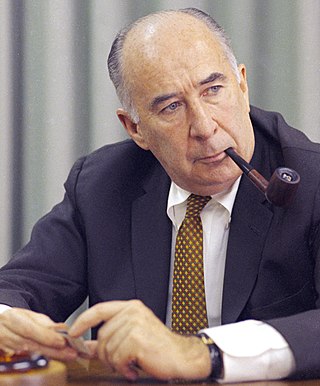
John Newton Mitchell was the 67th Attorney General of the United States, serving under President Richard Nixon and was chairman of Nixon's 1968 and 1972 presidential campaigns. Prior to that, he had been a municipal bond lawyer and one of Nixon's associates. He was tried and convicted as a result of his involvement in the Watergate scandal.
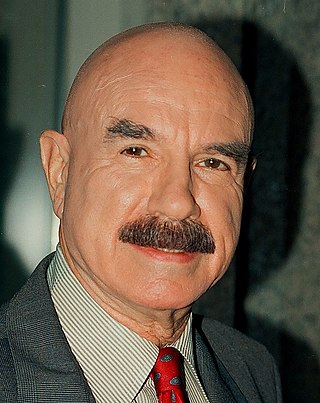
George Gordon Battle Liddy was an American lawyer, FBI agent, and a criminal who was convicted of conspiracy, burglary, and illegal wiretapping for his role in the Watergate scandal during the Nixon administration.

Jeb Stuart Magruder was an American businessman and high-level political operative in the Republican Party who served time in prison for his role in the Watergate scandal.

John Daniel Ehrlichman was an American political aide who served as White House Counsel and Assistant to the President for Domestic Affairs under President Richard Nixon. Ehrlichman was an important influence on Nixon's domestic policy, coaching him on issues and enlisting his support for environmental initiatives.

Ronald Louis Ziegler was the 13th White House Press Secretary, serving during President Richard Nixon's administration.
Herbert Warren Kalmbach was an American attorney and banker. He served as the personal attorney to United States President Richard Nixon (1968–1973). He became embroiled in the Watergate scandal due to his fundraising activities in the early 1970s, some of which supported undercover operatives directed by senior White House figures under Nixon. Kalmbach was convicted and served 191 days in jail for his part in the scandal, and lost his license to practice law for a time, although he was later reinstated.
Donald Henry Segretti is an attorney best known for working as a political operative with then-U.S. President Richard Nixon's Committee to Re-elect the President during the early 1970s. Segretti served four and a half months in prison after investigations related to the Watergate scandal revealed his leading role in extensive political sabotage efforts ("ratfucking") against the Democrats.

Louis Patrick Gray III was acting director of the Federal Bureau of Investigation (FBI) from May 3, 1972, to April 27, 1973. During this time, the FBI was in charge of the initial investigation into the burglaries that sparked the Watergate scandal, which eventually led to the resignation of President Nixon. Gray was nominated as permanent Director by Nixon on February 15, 1973, but failed to win Senate confirmation. He resigned as Acting FBI director on April 27, 1973, after he admitted to destroying documents that had come from convicted Watergate conspirator E. Howard Hunt's safe—documents received on June 28, 1972, 11 days after the Watergate burglary, and given to Gray by White House counsel John Dean.

John Wesley Dean III is an American attorney who served as White House Counsel for U.S. President Richard Nixon from July 1970 until April 1973. Dean is known for his role in the cover-up of the Watergate scandal and his subsequent testimony to Congress as a witness. His guilty plea to a single felony in exchange for becoming a key witness for the prosecution ultimately resulted in a reduced sentence, which he served at Fort Holabird outside Baltimore, Maryland. After his plea, he was disbarred.
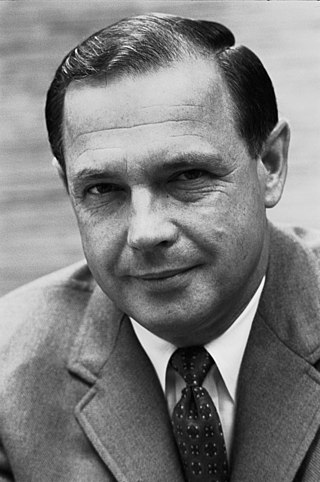
Alexander Porter Butterfield is a retired United States Air Force officer, public servant, and businessman. He served as the deputy assistant to President Richard Nixon from 1969 to 1973. He revealed the White House taping system's existence on July 13, 1973, during the Watergate investigation but had no other involvement in the scandal. From 1973 to 1975, he served as administrator of the Federal Aviation Administration.

Dwight Lee Chapin is an American political organizer, businessman and retired public servant. He was Deputy Assistant to President of the United States Richard Nixon during the Watergate scandal. Chapin was convicted of lying to a grand jury (perjury) during the scandal and served nine months at the Federal Correctional Institution, Lompoc.
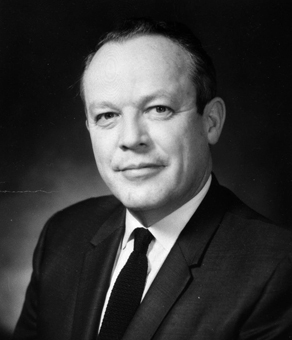
Richard Gordon Kleindienst was an American lawyer, politician, and U.S. Attorney General during the early stages of Watergate political scandal.

The Watergate Seven has come to refer to two different groups of people, both of them in the context of the Watergate scandal. Firstly, it can refer to the five men caught on June 17, 1972, burglarizing the Democratic National Committee's headquarters in the Watergate complex, along with their two handlers, E. Howard Hunt and G. Gordon Liddy, who were Nixon campaign aides. All seven were tried before Judge John Sirica in January 1973.

William Mark Felt Sr. was an American law enforcement officer who worked for the Federal Bureau of Investigation (FBI) from 1942 to 1973 and was known for his role in the Watergate scandal. Felt was an FBI special agent who eventually rose to the position of Deputy Director, the Bureau's second-highest-ranking post. Felt worked in several FBI field offices prior to his promotion to the Bureau's headquarters. In 1980, he was convicted of having violated the civil rights of people thought to be associated with members of the Weather Underground, by ordering FBI agents to break into their homes and search the premises as part of an attempt to prevent bombings. He was ordered to pay a fine, but was pardoned by President Ronald Reagan during his appeal.

The Watergate scandal refers to the burglary and illegal wiretapping of the headquarters of the Democratic National Committee, in the Watergate complex by members of President Richard Nixon's re-election campaign, and the subsequent cover-up of the break-in resulting in Nixon's resignation on August 9, 1974, as well as other abuses of power by the Nixon White House that were discovered during the course of the scandal.
Audio recordings of conversations between U.S. President Richard Nixon and Nixon administration officials, Nixon family members, and White House staff surfaced during the Watergate scandal in 1973 and 1974, leading to Nixon's resignation.

Murray M Chotiner was an American political strategist, attorney, government official, and close associate and friend of President Richard Nixon during much of the 37th President's political career. He served as campaign manager for the future president's successful runs for the United States Senate in 1950 and for the vice presidency in 1952, and managed the campaigns of other California Republicans. He was active in each of Nixon's two successful runs for the White House in low-profile positions.
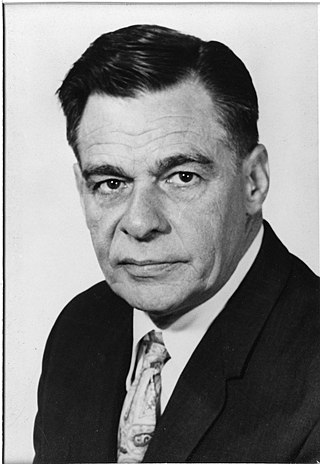
Henry E. Petersen was an attorney and United States federal government official. He served as Assistant U.S. Attorney General during the Richard Nixon and Gerald Ford administrations. He also engaged in ethically questionable communications with Nixon and his staff, providing inside information about the Watergate investigation prior to the appointment of the Special Prosecutor.

Proclamation 4311 was a presidential proclamation issued by President of the United States Gerald Ford on September 8, 1974, granting a full and unconditional pardon to Richard Nixon, his predecessor, for any crimes that he might have committed against the United States as president. In particular, the pardon covered Nixon's actions during the Watergate scandal. In a televised broadcast to the nation, Ford, who had succeeded to the presidency upon Nixon's resignation, explained that he felt the pardon was in the best interests of the country and that the Nixon family's situation was "a tragedy in which we all have played a part. It could go on and on and on, or someone must write the end to it. I have concluded that only I can do that, and if I can, I must."
References
- 1 2 "A Campaign Aide Admits Lying on Watergate Cash". New York Times. June 8, 1973. Retrieved April 17, 2024.
- 1 2 3 "Watergate Leaves Scars on Young Nixon Loyalist". New York Times. August 5, 1973. Retrieved April 17, 2024.
- 1 2 "Porter Gets 30‐Day Term For Lying on Watergate". New York Times. April 12, 1974. Retrieved April 17, 2024.
- ↑ Bernstein, Carl; Woodward, Bob (January 31, 1973). "News Analysis: Still Secret – Who Hired Spies and Why". Washington Post . Retrieved April 17, 2024.
- ↑ "The Other Nixon Watergate Men". Time magazine. March 11, 1974. Archived from the original on December 22, 2008. Retrieved March 30, 2009.
- ↑ "The Nation: 30 Days for Lying". Time. April 22, 1974. Retrieved April 17, 2024.